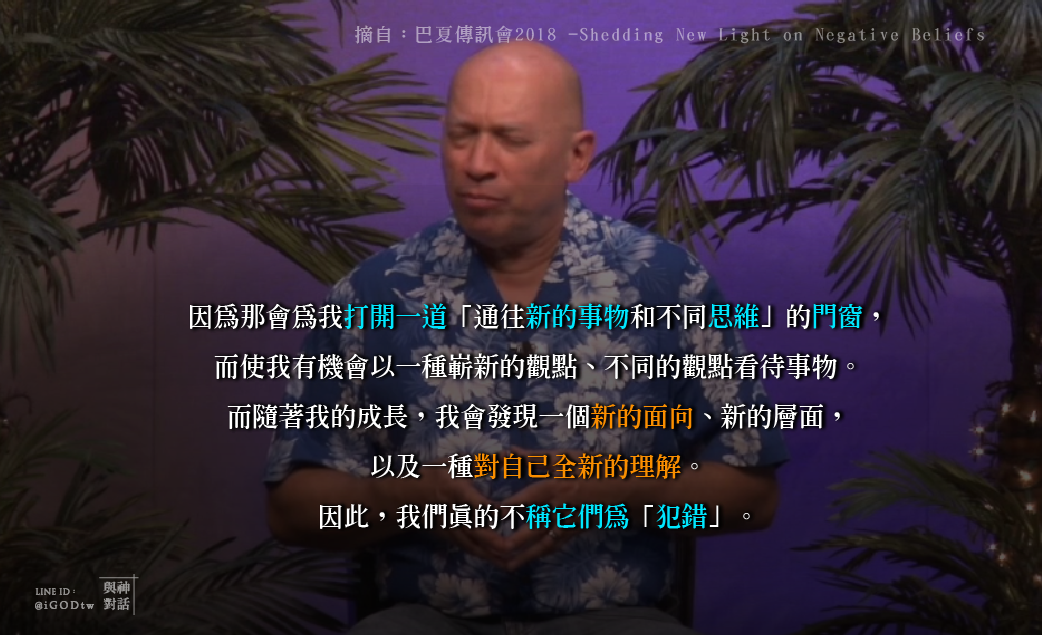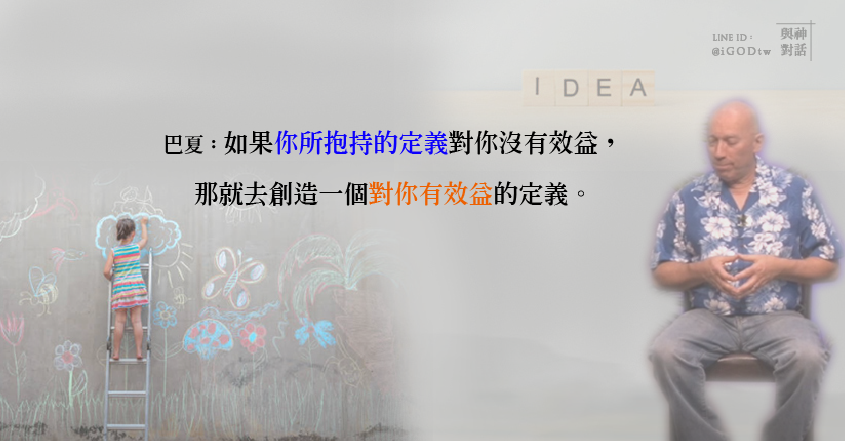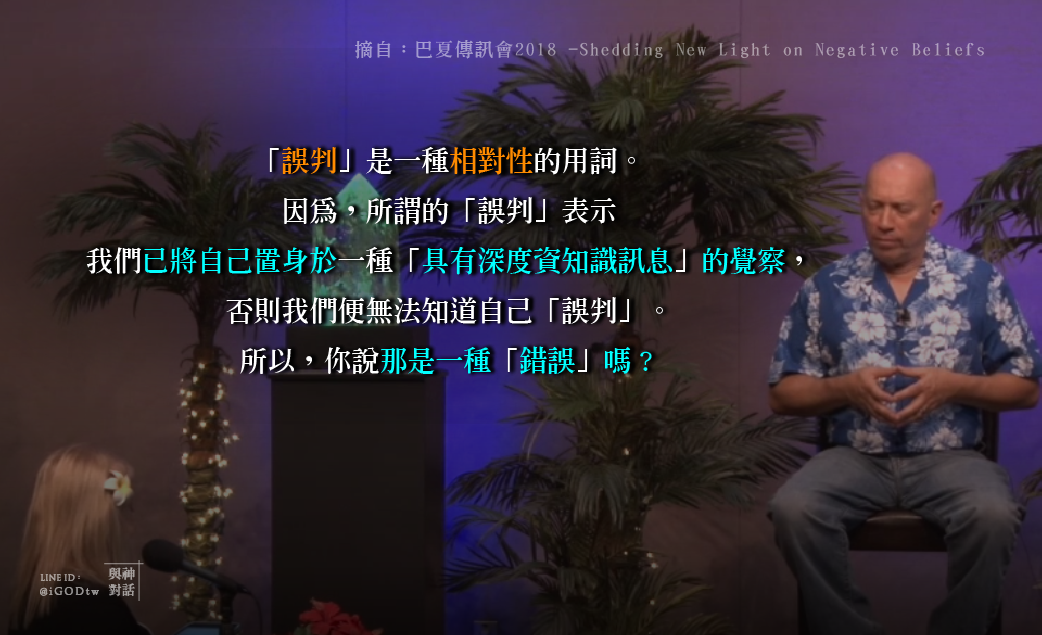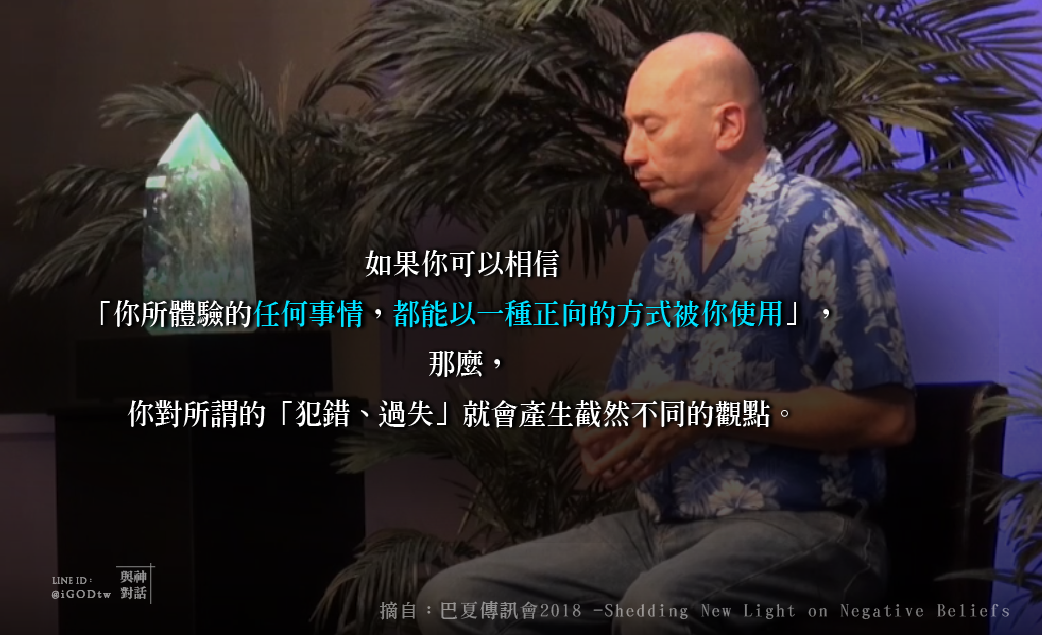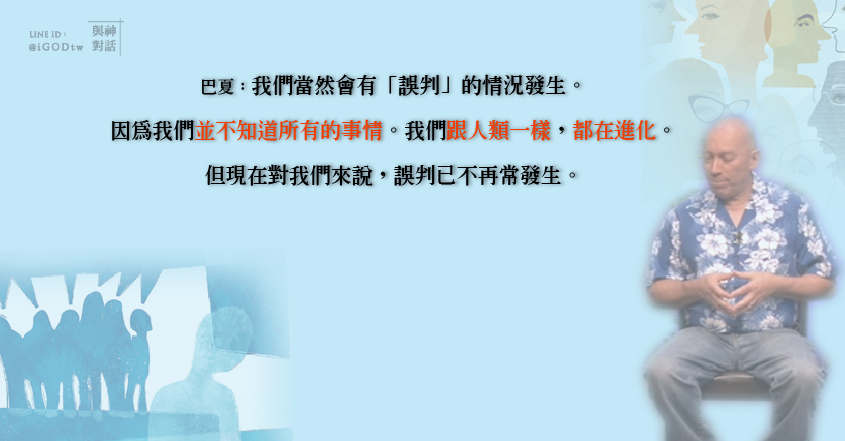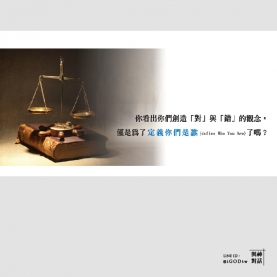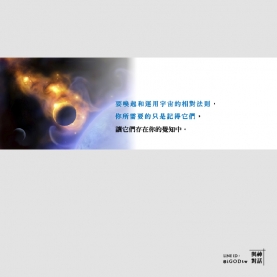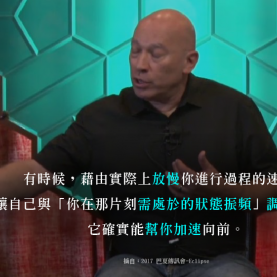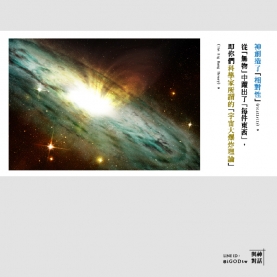巴夏精選短片(6分10秒)【為何宇宙中「高度演化生命」們能不犯錯?】Bashar334

此篇內容:
Q: What have you learned lately from mistake that you made?
Q: 巴夏,你最近有從自己犯的錯誤中學到什麼嗎?
Mistake?
犯錯?
I learned that I don't make them.
我學到的是:我不犯錯。
I learned that everything that happens, happens for a reason.
我學到的是:所有發生的事情,都有其發生的理由。
So, I wouldn't call it a mistake. Unexpected things? Absolutely.
所以,我不稱它為「錯誤」的事。視它為「意料之外的事」嗎?一點也沒錯。
But I don't call them mistakes.
但我不稱它們為「犯錯」。
I call them unexpected adventures, unexpected perspectives.
我稱它們為「意料外的冒險」、「意料外的觀點」。
Since that opened up a doorway, a window to something new and something different that gives you opportunity to look at something from a new perspective, a different perspective.
因為那會為你打開一道「通往新的事物和不同思維」的門窗,而使你有機會以一種嶄新的觀點、不同的觀點看待事物。
And discover a new aspect and a new understanding of myself as I grow.
而隨著我的成長,我會發現一個新的面向(新的層面),以及一種對自己全新的理解。
So, we don't really call them mistakes.
因此,我們真的不稱它們為「犯錯」。
But they can certainly be unexpected.
但它們確實可能是意料之外的。
Q: That definitely demonstrates how your energy is uplifted by re-calibration in a sense.
Q: 就某種意義來說,這明確地展現出你的能量是已經重新校準和提升的振頻能量。
Yes.
是的。
Q: As opposed to feeling like you make the same mistake again or… you know, the kind of things that humans…
Q: 當相較於好像「你又再犯同樣的錯誤」,或說…你知道的,那種人類會犯的事情…
If I make the same mistake again, it’s cause I’m enjoyed it so much the first time.
如果我會再次犯相同的錯的話,那是因為「我非常享受我當時所犯的」。
That would be the only reason.
那會是唯一的原因。
Q: So, can you have an error in judgment?
Q: 所以說,你們也會有「誤判」的情況發生嗎?
In a sense, yes, of course, we can.
就某種意義上來說,是的,我們當然會。
Because we don't know everything. We are evolving like you are.
因為我們並不知道所有的事情。我們跟你們一樣,都在進化。
Now it doesn't happen that much anymore.
現在對我們來說,誤判已不再常發生。
Because of our evolutionary place, and because we're tapping more into our spirit Self and have a broader picture of bigger point of view.
因為我們進化的地方,和因為我們更能夠連結上自己靈性層面的本我,所以我們有更寬廣的視野和觀點。
But it can happen again, it happens as an unexpected happenstance in certain ways that you can say goes back to a so-called "error in judgment.”
但它可能會再發生,可能會以某種「不可預料的方式」發生,而你可以回到你們的說法,稱這為所謂的「誤判」。
But since we don't really have insistences and assumptions and expectations in that way.
但因為我們真的不會有那樣的堅持、假設和期待。
An error in judgment, well, that's a relative term.
「錯誤判斷」,嗯,那是一種相對性的用詞。
Because a so-called error in judgment can put us in a place that gives us profound information we otherwise we wouldn’t have had.
因為,所謂的「誤判」,表示我們已將自己置身於一種「具有深度知識訊息」的覺察,否則我們便無法已知道自己「誤判」。
So, was it an error?
所以,你說那是一種「錯誤」嗎?
Q: It’s so amazing how this illuminates the difference between thinking supportive thoughts or choosing supportive thoughts.
Q: 這闡明「思索支持性的想法」與「選擇支持性的想法」之間的差異,是多麼令人驚奇啊!
Yes.
沒錯。
Q: On very simple thing like the idea of “mistakes”.
Q: 就非常簡單的事情,像「犯錯」的概念來看。
Yes, I'm not saying that's an egotistical position.
是的,我並非指那是一種「自我本位(自負)的」立場。
“Oh, I can simply do no wrong.”
「噢,我根本不會做錯什麼。」
But it's an idea of allowance, is an idea of recognizing that we don't know everything.
但這是個「容許」的概念,這是個承認「我們並不了解所有的事」的概念。
And therefore we are capable of being surprised by things and things may go in unexpected directions other than what we may have to some degree thoughts.
因此,我們(和人類一樣)是具有「對事情的發展,以及對事物可能會朝和我們在某程度想法上不同的方向發展」感到驚訝的能力的。
But we don't put so much into our thoughts that it's really that much of a surprise that things don't go that way.
但其實,我們對「事情沒有照我們的想法發展」這樣的事,並不會真的花太多心思和感到驚訝。
Because we allow for the flow, we allow for those things to happen.
因為我們讓事情順勢發展,我們讓那些事情自然發生。
Therefore, how can we really be surprised that they do, other than by being delighted by something that we didn't know is gonna happen?
因此,除了對「我們不知道的事情正在發生」感到愉悅外,我們怎麼會真的對發生的事感到驚訝呢?
Q: So, is it sort of, part of the human neuroses that we put so much into making the right decisions, discerning accurately that our self-worth becomes tied up?
Q: 所以,這是否可以說,有點像人類的恐懼症——因為我們投入大量的精力要做「對的決定」、要精確地辨別對與錯,卻反而被我們的「自我價值」束縛住了?
Absolutely.
正是如此。
Q: And then you can’t even learn from the mistake because you're so concerned that it might show that you're worthless to begin with?
Q: 因而,你甚至無法從過失中學到東西,因為,從一開始你就非常擔心自己會是個沒價值的人?
Correct.
沒錯。
Q: That sounds familiar? So, it's very interesting that just this kind of a change could have such a profound effect on the way you live your life when you find that you have changes in the way you perceive something.
Q: 這描述是否聽起來有點熟悉?所以,非常有趣的是,當你發現你以「自己察覺到」某事物的方式而產生改變時,僅是這樣的一個改變,就能在自己生活的方式上,產生如此深遠的影響。
Isn’t that what we have always said about: if the definitions are using don't work for you, create a definition that does.
這不就是我們經常提到的:如果你所抱持的定義對你沒有效益,那就去創造一個對你有效益的定義。
The same thing. Create a definition that works for you.
這和你剛才說的是一樣的道理。創造一個對你有效益的定義。
So, instead of going: “Oh, I made a mistake. I made an error. Something's wrong. I'm not worthy.”
所以,以其想著:「噢,我犯了一個錯,我造成了一個過失,事情很不對勁,我是沒價值的。」
It’s like: “Oh, things didn't turn out as I assume or expect, even if I didn't really assume or expect that much anyway which I probably didn't.”
你可以像這樣想:「喔,事情的結果不如我假設或期盼的,雖然我沒有真的去假設或期盼些什麼,我可能沒有那樣。」
“But nevertheless, it must have brought me to a place that’s going to serve me in ways I couldn't possibly comprehended from the state I wasn’t in before.
「但儘管如此,這結果必定已把我帶到一個情境,那情境會以一種『若不是我進入這情境,我便無法理解』的方式幫助我。」
“Now I’m in a new state. I wonder what's going to happen. Oh, this is gonna be fun.”
「現在,我處在一種全新的狀態。我很想知道事情接下來會怎麼發展,這必定很有趣。」
That's a different definition, and it creates a completely different experience.
這是一種不同的定義,它會產生一種完全不同的體驗。
So, why not chose that, if that's the kind of experiences you prefer?
因此,如果這是你較喜歡的體驗的話,何不選擇這樣的定義呢?
Because remember, experience is a result of definition, not the other way around.
因為,請不要忘記:「體驗」是「定義」的產物,而非定義是體驗產生的結果。
Q: And even that attitude doesn't come from the idea that the universe is a benevolent place?
Q: 即使那看法不是源自「宇宙是個慈愛的地方」的概念嗎?
It comes from the idea that the universe is an “allowing place”.
它是源自「宇宙是個容許萬物如是的地方」的概念。
And that is the most benevolent thing it can do,
而那是宇宙能做的「最慈愛」的事。
Is allows whatever you choose to be real, to be real.
也就是:不論你選擇什麼、視什麼為真實,它都會容許。
Remember, unconditional support, unconditional love, unconditional existence.
別忘了它是:無條件的支持、無條件的愛,無條件存在的實體。
So, you can choose to experience the universe as non-beneficial.
所以,你也可以選擇體驗宇宙為無益的。
Because it is so allowing, it will allow you to assume that it's not beneficial to you.
因為,宇宙是如此無條件地包容,它會容許你認為「它對你是無益的」。
That's how allowing it is.
這就是它多麼容許萬物如是的方式。
Q: So, if you project onto the idea that it's a beneficial universe in the sense that because the basic vibration is love, and everything that you create is designed to teach you to become more expanded.
Q: 所以,如果你投射「認為宇宙是有益的」的想法,就某意義上,因為它的基本振頻是愛,而你在宇宙中所創造的一切,都是設計來教導你,讓你更擴展自己。
Yes.
是的。
Q: That you can actually trust that what you are experiencing can be use in a positive way.
Q: 那麼,你可以實際上相信「你所體驗的任何事情,都能以一種正向的方式被使用」。
Why not?
為什麼不呢?
Q: And then mistakes are very different from that perspective.
Q: 那麼,我們對所謂的「犯錯、過失」就會產生截然不同的觀點。
Yes.
沒錯。
Because they are not really mistakes anymore. They’re course corrections.
因為,它們就不再是犯錯或過失了。它們是做法修正。
Unexpected course corrections.
預料之外的做法修正
Q: It's really lovely.
Q: 這真的很棒很可愛。
It is.
沒錯。

